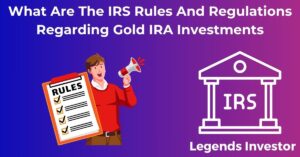Understanding Gold IRAs and Early Withdrawal Concerns
Investing in a Gold Individual Retirement Account (IRA) can provide a valuable diversification to your retirement portfolio. However, understanding the implications of early withdrawals is crucial for financial planning. This article will delve into the specifics of Gold IRAs, the rules surrounding early withdrawals, potential penalties, tax implications, and alternatives to early withdrawal.
What is a Gold IRA?
A Gold IRA is a type of self-directed IRA that allows investors to hold physical gold, as well as other precious metals like silver, platinum, and palladium, as part of their retirement savings. Unlike traditional IRAs that typically hold paper assets such as stocks and bonds, Gold IRAs allow you to invest in tangible assets, providing a hedge against inflation and economic uncertainty.
Why People Choose to Invest in a Gold IRA
Investors choose Gold IRAs for several reasons:
- Diversification: Adding gold to a retirement portfolio can reduce overall risk by diversifying the types of assets held.
- Inflation Hedge: Gold has historically maintained its value during inflationary periods.
- Economic Uncertainty: During economic downturns or market volatility, gold often retains or increases its value, providing stability.
General Considerations for Early Withdrawal from an Investment Account
Early withdrawal from any retirement account, including a Gold IRA, can have significant financial consequences. It’s important to consider the rules, penalties, and tax implications before making such a decision. Early withdrawals can erode your retirement savings, reduce future earnings potential, and result in substantial penalties and taxes.
The Rules: Gold IRA Early Withdrawal Guidelines
IRS Regulations on Gold IRAs
The IRS has strict rules governing Gold IRAs, including:
- Eligible Precious Metals: Only certain gold, silver, platinum, and palladium products meet the IRS standards for inclusion in a Gold IRA.
- Custodian Requirements: A Gold IRA must be managed by a custodian, typically a bank or brokerage firm, that is approved by the IRS.
- Storage Rules: Precious metals in a Gold IRA must be stored in an IRS-approved depository.
Difference Between Traditional and Roth Gold IRAs for Early Withdrawal
- Traditional Gold IRA: Contributions are typically tax-deductible, but withdrawals are taxed as ordinary income. Early withdrawals (before age 59½) are subject to income tax and a 10% penalty.
- Roth Gold IRA: Contributions are made with after-tax dollars, so qualified withdrawals are tax-free. Early withdrawals of earnings are subject to income tax and a 10% penalty, but contributions can be withdrawn penalty-free at any time.
Age Considerations for Penalty-Free Withdrawals
- 59½ Rule: Generally, withdrawals made before age 59½ are subject to a 10% early withdrawal penalty in addition to regular income tax.
- 72 Rule: Required Minimum Distributions (RMDs) must begin at age 72 for Traditional IRAs, including Traditional Gold IRAs. Roth IRAs do not have RMDs during the account owner’s lifetime.
Penalty-Free Scenarios for Early Gold IRA Withdrawal
Exceptional Circumstances Outlined by the IRS
The IRS allows for penalty-free early withdrawals in certain situations:
- Disability: If you become permanently disabled.
- Medical Expenses: Unreimbursed medical expenses that exceed 7.5% of your adjusted gross income.
- First-Time Home Purchase: Up to $10,000 for a first-time homebuyer.
- Higher Education Expenses: Qualified education expenses for you, your spouse, children, or grandchildren.
- Substantially Equal Periodic Payments (SEPP): Withdrawals made as part of a series of substantially equal periodic payments.
Life Events That May Qualify for Penalty Exemptions
Other life events such as the birth or adoption of a child may allow for penalty-free withdrawals up to $5,000 within one year of the event.
The Importance of Understanding Exceptions for Financial Planning
Knowing these exceptions can help you plan for unexpected expenses without incurring unnecessary penalties. This knowledge is essential for making informed decisions about your retirement savings.
The Cost of Hurried Decisions: Early Withdrawal Penalties
Calculating the Potential Penalties
If you withdraw from your Gold IRA before age 59½ without qualifying for an exemption, you’ll face a 10% penalty on the amount withdrawn, plus income tax on the distribution.
The Impact of Penalties on Long-Term Savings
Early withdrawals can significantly reduce your retirement savings. The penalties and taxes not only decrease the immediate value of your account but also diminish the compound growth potential of your remaining assets.
Case Studies Showing the Effect of Early Withdrawal on Investments
Consider the case of an investor who withdraws $50,000 from a Gold IRA at age 50. The immediate 10% penalty would be $5,000, and assuming a 24% tax bracket, the additional tax would be $12,000. This results in a net withdrawal of $33,000, but the investor loses $17,000 in penalties and taxes. Over 20 years, this amount could have grown significantly if left in the account.
Tax Implications of Withdrawing from a Gold IRA Early
How Taxes Apply to Early Withdrawals
Early withdrawals from a Traditional Gold IRA are taxed as ordinary income. For Roth IRAs, early withdrawals of earnings are taxed, but contributions are not.
The Difference in Tax Treatment Between Investment Gains and Principal Amounts
For Roth IRAs, contributions can be withdrawn tax-free at any time. However, earnings withdrawn before age 59½ are subject to taxes and penalties unless an exception applies.
Planning Taxes After an Early Withdrawal
Careful tax planning is essential if you anticipate needing to withdraw from your Gold IRA early. Consider consulting with a tax advisor to minimize the tax impact and explore alternatives to early withdrawal.
Navigating Market Conditions and Gold Prices
The Relationship Between Market Volatility and the Timing of Withdrawal
Market volatility can significantly impact the value of your Gold IRA. Withdrawing during a downturn can lock in losses, while strategic timing can help minimize financial loss.
Strategies to Minimize Financial Loss During a Market Downturn
- Partial Withdrawals: Consider partial withdrawals to mitigate the impact of market fluctuations.
- Alternative Funding: Explore other funding options to avoid selling assets at a loss.
- Market Timing: If possible, delay withdrawals until market conditions improve.
Historical Gold Price Trends During Economic Uncertainties
Gold has historically performed well during economic uncertainties, often increasing in value when other assets decline. Understanding these trends can help you make informed decisions about timing your withdrawals.
Alternatives to Early Withdrawal from a Gold IRA
Loan Options Against IRA Assets
Some retirement plans allow loans against IRA assets, providing access to funds without triggering early withdrawal penalties. However, Gold IRAs typically do not offer this option.
Rollover Opportunities to Other Retirement Accounts
Rolling over your Gold IRA to another retirement account may provide more flexibility and access to funds. However, it’s essential to understand the rules and potential tax implications of rollovers.
The Pros and Cons of Keeping Your Investment Versus Early Withdrawal
Weighing the benefits of preserving your Gold IRA against the immediate need for funds is crucial. Early withdrawal can have long-term negative impacts, while finding alternative solutions can help maintain your retirement savings.
Advisory Insights: When to Consult a Financial Advisor
The Role of a Financial Advisor in Making Early Withdrawal Decisions
A financial advisor can provide valuable guidance on whether early withdrawal is the best option. They can help you understand the financial implications, explore alternatives, and create a plan that aligns with your long-term goals.
How Expert Advice Can Prevent Costly Mistakes
Expert advice can help you avoid common pitfalls, such as incurring unnecessary penalties and taxes or depleting your retirement savings prematurely.
Finding a Trustworthy Advisor with Gold and IRA Experience
Look for a financial advisor with specific experience in gold investments and IRAs. Check their credentials, ask for references, and ensure they have a fiduciary duty to act in your best interest.
Decision Time: Evaluating Your Financial Priorities
Balancing Immediate Needs with Long-Term Financial Goals
Carefully evaluate your financial situation, considering both your immediate needs and long-term goals. Early withdrawal from a Gold IRA should be a last resort after exploring all other options.
Assessing the Urgency of Financial Situations
Determine whether your financial need is urgent and if other resources can be tapped before resorting to early withdrawal. This assessment will help you make a more informed decision.
Making an Informed Choice About Your Gold IRA
Ultimately, the decision to withdraw early from your Gold IRA should be based on a thorough understanding of the rules, penalties, tax implications, and alternative options. Consulting with a financial advisor can provide the insights needed to make the best choice for your financial future.
Investing in a Gold IRA can provide significant benefits, but it’s crucial to understand the implications of early withdrawal. By considering the rules, penalties, tax impacts, and alternative options, you can make informed decisions that protect your retirement savings and align with your long-term financial goals.



